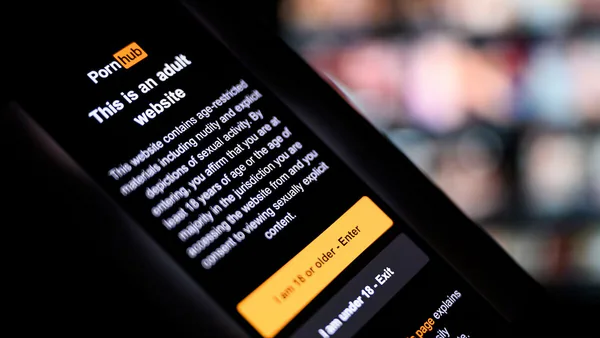Age Verification Law For 'Adult Content' Hurting Sites That Comply, Helping Those Who Don't: Report
Adult sites that complied with the law saw a sharp decline in traffic, while those that ignored it saw an enormous surge in visitors. Some non-compliant platforms reportedly even doubled or tripled their audiences in August compared with the same time last year, according to a Washington Post analysis.
US lawmakers eye similar measuresFederal and state lawmakers in the United States are considering pushing similar laws, not just for adult content, but also for social networks and video sites. Supporters, including US Senator Mike Lee, argue that restricting access to such sites using technology could help“stop those who profit from stealing the innocence of America's youth.”
The UK law and its unexpected outcomesUnder the UK's Online Safety Act, thousands of websites, particularly pornography sites, are required to verify users' ages. Many sites that complied saw a drastic drop in traffic from British users.
According to John Scott-Railton, a researcher at the Citizen Lab at the University of Toronto, the age-verification laws drove people to seedier corners of the web, hence“rewarding the very sites that scoff at their rules.”
In the US, 25 states have passed laws requiring age verification for adult websites since 2022, though many are being challenged in court.
Also Read | OnlyFans sale plan: Here's how much Leonid Radvinsky made from adult siteSupporters of the laws, like Ohio state Rep Steve Demetriou, argued that simply“clicking a box that says 'Yes, I am 18' is not gonna prevent a 15-year-old boy from going on that website."
However, critics, including civil liberties groups, warn that such laws pose major privacy risks, as they require both adults and children to hand over sensitive personal data to third-party contractors. This data could be vulnerable to breaches or misuse, as seen in the case of the Tea Dating Advice app, which exposed thousands of women's selfies and driver's license photos after a cyberattack.
Financial burdens of such lawsThe financial cost of implementing age-verification systems is another significant challenge. Companies seeking to comply with the law must pay private contractors like Yoti and Incode for the verification checks, which can quickly become expensive.
For example, an Indiana judge estimated that Pornhub could face potential charges of more than $13 million a day. A Yoti representative said last year the company typically charges between 10 and 25 cents per face scan.
These costs aren't limited to just big tech companies. According to the Washington Post, complying with these laws is disproportionately difficult for small platforms.
Issues with face scans to verify ageThe law's impact extends beyond pornographic content. In the UK, services like Spotify, X (formerly Twitter), Discord, Telegram and Reddit have begun checking some users' ages through measures like face scans. Activists fear this could lead to a“censorship movement” that can“wall off huge sections of the internet."
The technology itself is far from perfect. Face scans can sometimes misclassify users, as seen when a 25-year-old woman with dwarfism was falsely flagged as a child and banned from TikTok. Additionally, these systems can be tricked, with guides showing how to bypass them using the faces of video game characters.
Also Read | Elon Musk's X ordered to block porn access for kids or face up to £200mn fine“It's a lot more complex than showing your ID before you enter a pub,” said Aliya Bhatia, a policy analyst at the Centre for Democracy and Technology.
She said the UK's law“rests on two false notions: that there's a silver bullet - an easy, rights-respecting, affordable way to do age verification online - and that users don't care about their rights and privacy.”
The UK's attempt to enforce the law has also unintentionally promoted methods to bypass the verification process.
Also Read | XVideos, Pornhub, and others face EU heat over child safety failures Surge in VPN downloads after UK lawThe UK's efforts to enforce the law have also inadvertently promoted workarounds, such as a high number of VPN downloads.
When Peter Kyle, a member of Parliament and the British government's secretary of state for science, innovation and technology, warned users against using VPNs to trick the system, downloads of VPN apps soared to the top of the country's app-store download charts.
As the Washington Post said, the message was received, but likely not in the way the government intended, providing the VPN industry with“the slickest free advertising ever received.”
Legal Disclaimer:
MENAFN provides the
information “as is” without warranty of any kind. We do not accept
any responsibility or liability for the accuracy, content, images,
videos, licenses, completeness, legality, or reliability of the information
contained in this article. If you have any complaints or copyright
issues related to this article, kindly contact the provider above.
Most popular stories
Market Research

- Microgrid Market Growth, Key Trends & Future Forecast 2033
- Nickel Market Estimated To Exceed USD 55.5 Billion By 2033
- Primexbt Launches Empowering Traders To Succeed Campaign, Leading A New Era Of Trading
- Chaingpt Pad Unveils Buzz System: Turning Social Hype Into Token Allocation
- Ecosync & Carboncore Launch Full Stages Refi Infrastructure Linking Carbon Credits With Web3
- Japan Halal Food Market Size To Surpass USD 323.6 Billion By 2033 With A CAGR Of 8.1%






















Comments
No comment